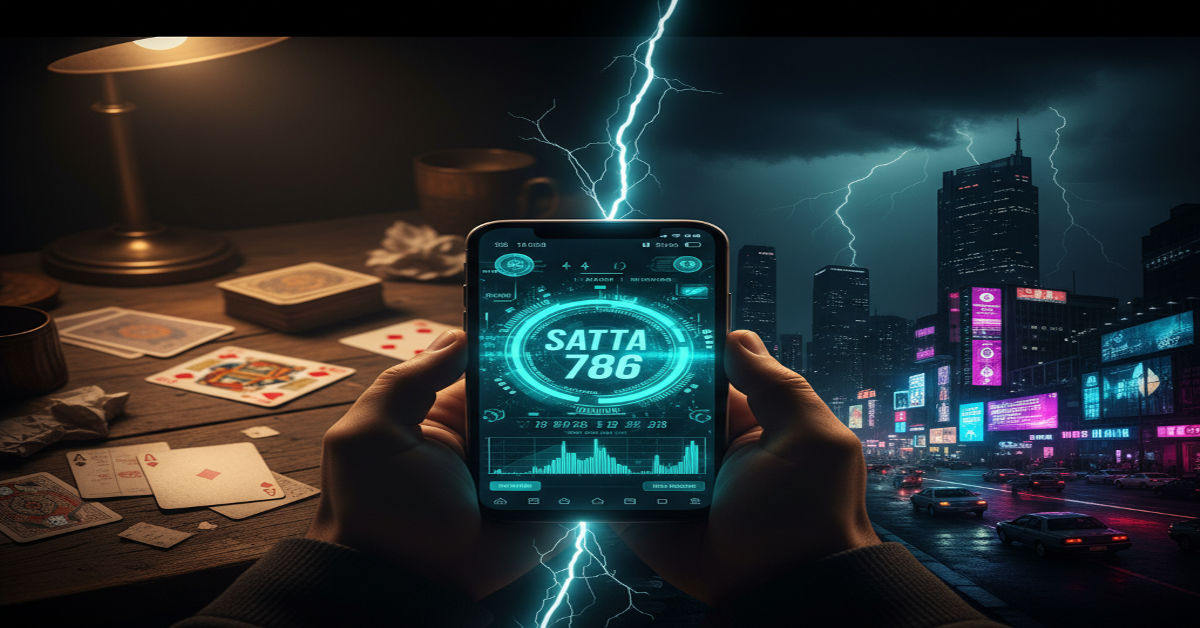On any given evening in the backstreets of Delhi, you can hear the same murmured sequence of numbers “Gali 57, Desawar 37.” For some, these are meaningless digits; for others, they are the pulse of an underground economy. These numbers belong to Satta King 786, a variant of India’s long-standing illegal betting game popularly called “matka.” Within the first hundred words: Satta King 786 is an unregulated numbers-based betting system — banned in India — yet still widely played both offline and online.
But this is not just a story about gambling. It’s about aspiration, debt, digital transformation, and the moral gray zones of an economy that thrives where regulation doesn’t reach. In small towns and large metros alike, the game functions as both a dream machine and a debt trap, connecting informal lenders, mobile apps, and everyday people chasing a lucky number.
What makes Satta King 786 noteworthy is not its novelty but its persistence. Despite decades of crackdowns, arrests, and awareness drives, it survives — now thriving on smartphones and Telegram channels rather than in dark alleys. It speaks volumes about India’s appetite for risk and the enduring hope that one good number can change everything.
A Brief History of Satta and the Rise of 786
Satta — derived from the Hindi word for “bet” — began as a 1960s game tied to stock-market numbers. Workers in Mumbai’s textile mills placed wagers on the closing rate of cotton. When official data feeds stopped, bookies invented local draws, writing numbers on paper slips dropped into clay pots, or matkas.
The “King” titles that followed — Desawar King, Gali King, and now Satta King 786 — emerged as digital branding. The number “786” holds cultural significance across South Asia, often symbolizing divine luck. Its use gives the game a veneer of fate or faith, blending superstition with speculation.
Legally, Satta remains prohibited under India’s Public Gambling Acts, though enforcement varies by state. Yet despite raids and arrests, the network’s resilience lies in its informality: cash-based, decentralized, and now, increasingly, digitized.
How the Game Works
The mechanics are deceptively simple. A player chooses a sequence of digits — typically two or three numbers between 0 and 9 — known as a “jodi” or “patti.” When the day’s result is declared, winners can earn returns up to 90-fold.
Behind this simplicity lies an informal web of agents, collectors, and now online operators. Results once chalked on shop shutters are today broadcast on websites and mobile apps, updated hourly.
| Element | Traditional Matka | Satta King 786 (Modern Variant) |
| Location | Street corners, local bazaars | Mobile apps, Telegram groups |
| Medium | Paper slips, oral communication | Digital charts and “leak numbers” |
| Payment method | Cash only | Cash + online wallets |
| Regulation | None | None — often masked as “games” |
| Risk to players | Legal + financial | Legal + financial + digital fraud |
Despite technological upgrades, the basic rule persists: the house always wins. “Players think it’s luck; operators treat it like business,” says Delhi-based sociologist Dr. Anand Menon, who studies informal economies. “That asymmetry of information defines every round of play.”
The Economics of an Underground Market
By conservative estimates, informal betting networks across northern India move several hundred crore rupees annually. No official data exist, but anecdotal accounts from enforcement officers suggest Satta King 786 markets mirror small-scale stock exchanges — only without transparency or taxation.
Bookies act as liquidity hubs, pooling thousands of micro-wagers. Payouts for the rare winners are funded by the steady losses of others. Informal credit lubricates the system: players borrow from friends, shopkeepers, even local loan sharks. Interest rates can soar to 20 percent a month.
| Financial Aspect | Licensed Lottery | Satta King 786 |
| Oversight | State-regulated | None |
| Credit involvement | Minimal | High — often informal debt |
| Transparency | Published odds | Opaque “tips” and “leaks” |
| Social perception | Entertainment | Stigmatized, risky |
| Economic impact | Tax revenue | Unrecorded cash flow |
Economist Dr. Raghav Iyengar explains: “These games behave like shadow stock markets for those excluded from formal finance. Risk is identical — but there’s no safety net.”
Digital Shift: The Smartphone Casino
A decade ago, playing required knowing a local agent. Today, it requires nothing more than a smartphone. WhatsApp groups, anonymous forums, and unregulated apps promise “daily lucky numbers” or “786 leaks.” Many of these platforms claim educational or numerology purposes to skirt legal scrutiny.
According to cybersecurity consultant Sonal Bose, “Most of these apps collect user data under the guise of gaming. Players risk not only money but personal information — names, phone numbers, digital wallets — which can be resold or exploited.”
The anonymity of mobile transactions has also attracted criminal elements. With no oversight, manipulation is easy: results can be changed retroactively, and winnings withheld. What was once a community-based trust system has turned into algorithmic opacity.
The Human Cost
Behind every flashing number board is a personal story — usually of loss. Psychologists categorize gambling addiction alongside substance abuse because it triggers similar dopamine pathways.
Case studies from rehabilitation centers in Jaipur and Lucknow show that habitual Satta players often experience anxiety, sleep disruption, and mounting debt. Families, not individuals, bear the brunt. “It’s not just financial erosion; it’s emotional bankruptcy,” says counselor Meena Prakash, who works with affected families.
Players often rationalize their behavior as investment. But as losses pile up, the emotional toll deepens. Community stigma prevents many from seeking help. “You can hide a drink,” says Meena, “but you can’t hide debt.”
Law and Enforcement: A Cat-and-Mouse Game
Policing Satta networks is notoriously difficult. Operations are decentralized, phone-based, and cash-heavy. Whenever one syndicate is dismantled, another appears under a new name — often with the same numbers and players.
Law enforcement typically relies on tip-offs, surveillance, or digital-forensics units tracing online betting traffic. Yet most arrests are small-scale, targeting runners rather than organizers.
Legal scholar Vikram Pathak observes, “The law treats gambling as moral vice rather than economic activity. That moral framing prevents practical regulation.” The result: sporadic crackdowns, little deterrence, and endless reincarnation.
Why It Persists
Despite the risks, Satta King 786 endures for several intertwined reasons:
- Economic aspiration: For low-income players, it feels like the only viable path to upward mobility.
- Cultural belief: Numerology, astrology, and fate make “lucky numbers” socially acceptable.
- Accessibility: Mobile technology democratized entry — anyone with a phone can play.
- Lack of alternatives: Excluded from formal credit, many see gambling as “investment.”
- Weak enforcement: Dispersed organization makes the network resilient.
Sociologist Dr. Menon adds, “You can’t outlaw aspiration. As long as inequality exists, systems promising instant fortune will thrive.”
Public-Health and Educational Responses
Over the past few years, NGOs and government programs have started reframing gambling as a public-health issue. Awareness campaigns focus on financial literacy and responsible digital behavior rather than moral condemnation.
Dr. Lopez advocates “behavioral nudges”: pop-up warnings on gambling apps, automatic spending limits, and easy opt-out systems. “We need smarter design, not louder bans,” she argues. “Just like tobacco or alcohol regulation, harm reduction saves more lives than moral panic.”
Financial educators also suggest integrating gambling awareness into school curricula, teaching probability, risk, and basic budgeting. When people understand odds, temptation weakens.
The Way Forward: Between Regulation and Reality
Completely eradicating Satta King 786 may be unrealistic, but reducing its harm is not. Experts propose a three-layer approach:
- Regulate: Target digital intermediaries and impose clear liability for hosting betting apps.
- Educate: Expand public campaigns about gambling addiction and debt cycles.
- Include: Strengthen formal micro-finance and savings tools so vulnerable groups have safer options.
Technology itself can become a tool for accountability. Algorithms that detect suspicious transaction clusters or gaming-related payments could curb the digital spread. Yet the broader challenge remains social — bridging the gap between aspiration and opportunity.
Conclusion
The story of Satta King 786 is not merely about numbers on a screen it is about what those numbers represent — the promise of control in an unpredictable world. The game’s endurance across generations shows how desire and desperation intertwine in economies of scarcity.
As India digitizes rapidly, the same technologies that empower can also exploit. Regulation alone won’t end the cycle. Empowerment — through literacy, inclusion, and empathy — might.
For policymakers, the question isn’t how to chase every illegal draw, but how to replace its allure with legitimate pathways for risk, reward, and dignity. Until that happens, the next number will always feel like a chance worth taking.
FAQs
Q1: What is Satta King 786?
It’s an illegal numbers-based betting variant of the traditional Indian matka system, now digitized through apps and websites.
Q2: Is it legal in India?
No. Gambling of this kind is banned under state and central laws, though enforcement varies by region.
Q3: Why is “786” used in the name?
The number 786 is considered auspicious in South Asian cultures, symbolizing divine blessing — a marketing tactic for luck.
Q4: What are the main risks?
Financial loss, addiction, data theft through fake apps, social stigma and potential legal consequences.
Q5: How can harm be reduced?
Through digital regulation, financial literacy, public-health interventions and accessible addiction-support programs.







